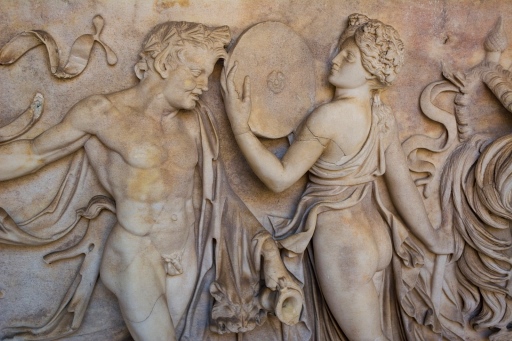Septimio Acindino or the Justice of Rome

Being Septimio Acindino proconsul of Syria in the time of Trajan (53 to 117 AD), he commanded that, turn on Antioch to a Christian, because he had not paid the Roman administration a certain amount of gold with which he had been fined. As the debt could not be returned, Acindino, in application of the Roman Law of the time , threatened him with death if he did not pay what he owed before a date.
The debtor's wife - a woman of singular beauty - did everything possible to gather, before the deadline, the amount that was requested from her husband but could not achieve it, so the death of her husband It seemed inevitable. But behold, a rich and powerful man of the country heard of this incident, called the woman and, alone, made a proposal: if he consented to satisfy his fleshly desires, he would give him the amount he needed to save his wife. husband.
The woman, also Christian, overwhelmed, went to tell her with fear and embarrassment to her husband, but to his surprise he begged her to save his life, even if he had to accede to the wishes of the powerful . A minor evil-to go out of lust-to achieve a greater good-to save her husband's life-was what the man argued.
The woman obeyed her husband and the night before the planned execution was given to the powerful, but the rich man, once satisfied his desire, instead of giving him the amount of gold he had promised, and save the death of her husband, deceived her by giving him instead a bag full of sand.
Arriving at the court, the woman found no gold but sand in the bag that she had brought so far, so she could not pay the debt.
But the surprise was such that the seizure and the distress that caused him, that Septimio Acindino asked for it and, informed by the woman of what had happened, the Roman proconsul paid the debt out of his own pocket, ordered the release of the husband and he called the libertine. The proconsul, first heard his excuses and then, his embarrassed confession, and resolved the case in a way that has come down to us through the centuries.
The rich lustful was condemned to give, to the woman and her husband, the field from which he had taken the sand and to return the amount of gold that the proconsul had advanced.
This story has been going round the history of thought ever since (1) because it poses with harshness if it is lawful to do a wrong -for example, break the fidelity to the husband- to achieve a greater good, the life of it.
We will not enter here today, but we will say that we that surprises and admires us, even more than that philosophical question, is the impeccable reaction of the proconsul.
That's how the ancient Romans were then.
So I can not leave it today but with a old farewell formula to the Roman: follow with health!
Miguel Villarroya Martín , to December 15 of 2015/Madrid. Spain/ventasgrandes.net/RdP.003
Notes:
(1) Centuries later, Voltaire, tells a story similar. Can be seen in Complete stories in prose and verse (Translation and editing of Mauro Armiño, Siruela, Madrid , 2006.) Read on. http://www.e-torredebabel.com/Biblioteca/Voltaire/adulterio-Diccionario-Filosofico.htm .Do not confuse this Roman proconsul Acindino, with San Acindino, a fourth-century Christian saint who died martyred in Persia and whose feast is celebrated by the Catholic Church on November 2 .
(4) Serafín Bodelón , from the University of Oviedo (Spain), notes in its Names for Hispanic History of the 4th century after Christ , the following: Year 317 and 326: SEPTIMIO ACINDINO was vicar of Hispania in 317 and also in 326 according to the inscription CIL, II, 4107 found in Tarragona. He built the village of Bauli, later owned by Symmachus, who recalls in his Oratio Constantii ad Themistium that Septimio Acindino was prefect in the years 338-340. And in the year 340 Septirian Acindino was Consul along with Veleyo Proculus.
(5) Septimio Acindino, proconsul romano.The image we have used in this postcard is of the extraordinary Russian photographer serghei_topor and it was on PIXABAY.COM under the CC0 Public Domain label. We both express our gratitude for their courtesy by allowing us to use their beautiful image.



